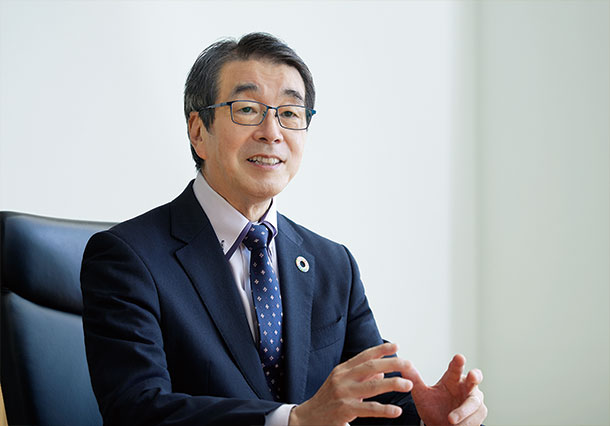
Home > Investor Relations > IR Library > Annual Report > Message from the Outside Member of the Board of Directors
Message from the Outside Member of the Board of Directors

Makoto Kaiwa
Chair of the Nomination Committee
Outside Member of the Board of Directors
Toward sustainable growth and improved governance at Japan Post Bank
Things to keep in mind in the management of Japan Post Bank
~Crisis management and contribution to the community~
I have worked for Tohoku Electric Power Co., Inc., for many years, serving as President and Chair since 2010. Shortly after becoming President, the Great East Japan Earthquake struck. With the slogan "Reconstruction of the region starts with electric power," we focused on rapid restoration while also promoting business innovation, including the liberalization of electricity retailing and the spin-off of the power transmission and distribution business, which had been part of our operations since our founding.
Since its founding, Tohoku Electric Power has aimed to contribute to the development of the region through its electric power business, which is an essential part of people’s lives and industry, based on its management philosophy of "co-prosperity with the local community." This has become part of the company’s DNA, and when encountering various changes, such as natural disasters, accidents, and fuel market fluctuations, I have always kept in mind the question, "How can we contribute to the local community?"
Although our business fields and founding histories differ, I feel that there are many similarities with Japan Post Bank, which also has the purpose of "contributing to the development of society and the community." As someone who has experienced leading an electric power company, there are two points I would like to share with the President and the executive team.
The first point is that "crisis management is the most important responsibility of top management."
The key lesson I learned from the management crisis following the Great East Japan Earthquake was that crisis management is the most important thing for a company and that preparedness determines success or failure. There are countless examples of companies whose very existence was threatened by a failure in crisis management.
It is important to conduct crisis management simulations and training on a regular basis, to prepare through organizational development and human capital development, and for top management to have the determination to stand at the forefront.
For Japan Post Bank, not only natural disasters but also market risk and IT system risk are major crisis management issues, and we have established the Risk Committee and a supervisory system that includes external experts. I believe that crisis management should not be left to the executive officers alone, but that Outside Members of the Board of Directors must also pay the utmost attention to this issue.
The second point is to "face local communities with sincerity."
Again, I would like to refer to the Great East Japan Earthquake. The Onagawa Nuclear Power Plant, which was closest to the epicenter, decided to shut down safely on the day of the earthquake and to take in residents from the surrounding area as an emergency measure. Many people lived in the gymnasium of the power plant. I believe that the smooth evacuation was possible because of the trust that had been built up through dialogue during normal times. In addition to the rapid restoration work, I felt a strong sense of mission that "the reconstruction of the community starts with electric power."
Japan Post Bank’s strengths are its nationwide post office network and its customer base, which is the largest among Japanese banks. We aim to be "the most familiar and trusted bank." Conversely, this means that our business cannot exist without the support of the local community. That is why it is important to be sincere and attentive to our local customers in all our operations, and our new Σ Business must also contribute to the development of the local economy.
Scandals pose a threat to customer trust
On the other hand, scandals involving the Japan Post Group, including Japan Post Bank, have continued to occur since I became an Outside Member of the Board of Directors in 2019. Unfortunately, there has recently been a case of violation of laws and regulations regarding the handling of non-public financial information on deposits at post offices. In addition, there have been several cases of embezzlement and other scandals at post offices and other locations, and the corporate culture of the Group has been criticized.
Japan Post Bank has a supervisory responsibility as the outsourcing client for incidents that occur at post offices. We sincerely apologize for causing anxiety and concern to our customers, shareholders, and many other people who have placed their trust in the Japan Post Group. We are concerned that these incidents might cause the Japan Post Group to lose the trust of its customers, local communities, and society, and ultimately lose its valuable customer base.
Going forward, we believe it is necessary to thoroughly implement measures to prevent recurrence, such as education, training, and monitoring, and to consider fundamental measures, such as reviewing our business structure to position Japan Post as a joint partner rather than a subcontractor.
There is no end to governance reform
Recognizing that corporate culture and governance issues were among the root causes of these scandals, the Board of Directors of Japan Post Bank is working to improve governance.
The Board of Directors has deepened its understanding of business execution through measures such as ensuring diversity on the Board (with at least 60% of directors being independent Outside Members of the Board of Directors and at least 30% being women), establishing the Risk Committee, holding meetings of independent Outside Members of the Board of Directors, participating in executive training, and conducting site visits and dialogues with employees.
As a result, the Board of Directors is now able to engage in free and lively discussions on individual proposals as well as business strategies such as the Medium-term Management Plan, drawing on the diverse backgrounds of its members. In addition, to strengthen information sharing and communication among Group companies, Japan Post Holdings has established a group CxO and started holding roundtable meetings with the presidents of each company. We believe that Japan Post Bank’s governance is steadily evolving, and we will continue to make constant efforts to further improve its effectiveness.
Taking on new business challenges will bring sustainable growth
Japan Post Bank has secured steady earnings in domestic and overseas markets backed by abundant funds and has achieved earnings levels exceeding its management plans in recent years. However, we recognize that there is still a gap between our performance and market expectations. We aim to further expand earnings through appropriate portfolio management in the market business, while maintaining our customer base in the retail business by integrating digital channels such as the Yucho Bankbook App with physical channels. We also plan to get the Σ Business, which was launched as a new system for circulating funds to regional communities, on track.
With the sale of Japan Post Bank shares by Japan Post Holdings, Japan Post’s shareholding in Japan Post Bank has fallen below 50%. Going forward, the partial relaxation of the "add-on restrictions" under the Postal Service Privatization Act will make it easier to take on new business challenges. Even if Japan Post Holdings proceeds with further disposal of its shares, we believe that Japan Post Bank’s role as a member of the Japan Post Group will remain unchanged, but we hope that it will conduct its business in a more autonomous manner and with greater consideration for minority shareholders. We, as Outside Members of the Board of Directors, will continue to make proposals regarding the balance between profitability and social contribution, the ideal form of group management, and other matters.
Expectations for the young new leader
I also serve as Chair of the Nomination Committee and have been actively involved in improving the governance of Japan Post Bank through the formulation of nomination criteria for candidates for Member of the Board of Directors, the determination of proposals to be submitted to the Shareholders’ Meeting regarding candidates for Member of the Board of Directors, and the formulation of a succession plan for President & CEO, Representative Executive Officer.
Last year, Takayuki Kasama, who had mainly led the Investment Division, was appointed President. Despite the challenges ahead, including addressing the recent misconduct incident, progress toward full privatization, and the challenge of developing a new business model, we must approach our future with the resolve that "crisis management is the top priority of executive leadership." I expect the new President to demonstrate leadership with his youth and initiative, laying the foundation for future growth and sustainability. I will do my utmost to support him in this endeavor.
